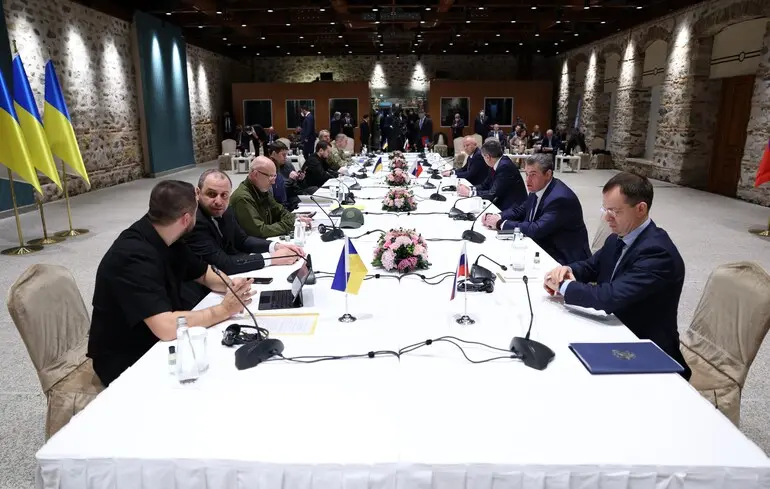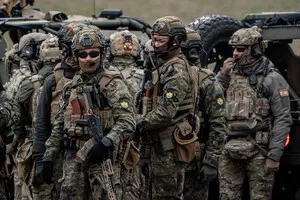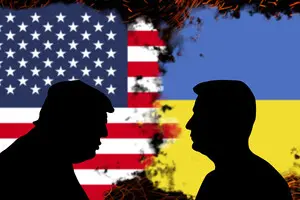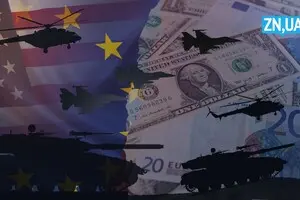Istanbul-2 Will Kill Ukraine

The US President's special envoy and Donald Trump's personal friend Steven Witkoff must have really had a thorough talk with Vladimir Putin. And now he is repeating Russian narratives and the Kremlin's “wishlist.”
When Moscow used to assure that Russia was ready to negotiate, it used to add the phrase “on the basis of the Istanbul agreements and realities on the ground.” Now Washington has started talking about it as well. In an interview with CNN, Witkoff not only said that in any peace agreement “each side will make concessions, whether territorial or economic,” but also expressed an opinion that the draft Istanbul agreement could become “a benchmark for a peace agreement between Ukraine and Russia.”
This is not happy news for us at all: the Istanbul agreements are a rotten canned food that threatens Ukraine with botulism and an agonizing death.
Let us recall that three years ago, when Russian troops were near Kyiv, the Ukrainian side, initially meeting with the Russian delegation in Belarus, tried to end the war through diplomacy in Istanbul, insisting on the restoration of the status quo as of February 23, 2022 and trying to obtain security guarantees. The Russians had their own interest: they sought to secure the occupation of Donbas and Crimea, and to “demilitarize” and “denazify” Ukraine by stripping it of its military capabilities and identity.
Judging by the first members of the Ukrainian delegation, it was formed hastily and was made up of random people with no security clearance. The composition of the delegation, headed by David Arahamia, who was close (at that time) to the Office of the President of Ukraine, was formally approved by presidential decree only on April 4, 2022. The directives were also signed on the same day.
Such violation of rules, including of the presidential decree “Issues of Coordination of Foreign Policy Activities of the State,” is not uncommon in Ukraine. As one of the interlocutors of ZN.UA noted, presidents do not fancy signing inconvenient documents. And Petro Poroshenko did not sign the delegation's directives to negotiate the Minsk accords. It is possible that in that situation there was no time for formalities, and the Presidential Office decided not to bother with such “trifles.”
After Russian atrocities in Bucha became known, Volodymyr Zelenskyy said that even after the disclosure of the terrible consequences of the occupation of Ukrainian cities by the Russian military, it was necessary to continue negotiations with the Russian side. Nevertheless, a few days later, the negotiations were terminated. The reasons were different: the retreat of Russian troops from under Kyiv; the position of the Ukrainian army; the lack of readiness of many Western states to put signatures under the agreement on security guarantees, etc.
The Istanbul communiqué and the draft “Treaty on Permanent Neutrality and Security Guarantees for Ukraine” with several annexes are what’s left from these first negotiations.
The Istanbul communiqué is the Ukrainian side's 11-point proposals presented to the Russians in Istanbul on March 29. The content of this document was shared most fully by Russian journalist Farida Rustamova. The key provisions of the Ukrainian proposals are as follows.
Firstly, Ukraine is proclaimed a permanently neutral state.
Secondly, a number of states provide Ukraine with guarantees. In Kyiv’s opinion, such states could be the UK, China, the Russian Federation, the United States, France, Turkey, Germany, Canada, Italy, Poland and Israel.
Thirdly, international security guarantees to Ukraine under the agreement will not apply to Crimea, Sevastopol and the occupied areas of Donbas.
Fourthly, Ukraine will not join any military alliances, will not deploy foreign military bases and contingents and will conduct international military exercises only with the consent of the guarantor states. The guarantor states confirm their intention to promote Ukraine's membership in the European Union.
Fifthly, in the event of an armed attack on Ukraine, each of the guarantor states, after urgent and immediate consultations between them (to be held within no more than three days), shall provide assistance to our country. The assistance will include, inter alia, the protection of airspace over Ukraine, the provision of necessary armaments and the use of armed force.
Sixthly, it is proposed to enshrine the aspiration of the parties to resolve the issues pertaining to Crimea and Sevastopol through bilateral negotiations between Ukraine and Russia within 15 years. It is also proposed to enshrine that Ukraine and Russia will not solve the issues of Crimea and Sevastopol by military means and will continue to exert politico-diplomatic efforts to resolve this issue.
Seventhly, the “Treaty on Permanent Neutrality and Security Guarantees for Ukraine” will enter into force after Ukraine's status as a permanently neutral state is approved by an all-Ukrainian referendum, the relevant amendments are made to the Constitution of Ukraine and the document is ratified by the parliaments of Ukraine and the guarantor states.
As for the draft “Treaty on Permanent Neutrality and Security Guarantees for Ukraine,” Putin first showed part of the document in the summer of 2023. A year later, The New York Times published the full draft treaty dated April 15, 2022. It contains the following: the Russian position not agreed upon by the Ukrainian delegation; the Ukrainian position not agreed upon by the Russian side; and Russian proposals that Kyiv refuses to discuss, citing their absence in the Istanbul communiqué.
According to Putin, the treaty “has been initialed by the Kyiv delegation, the signature is there.”
Publicly, Kyiv does not recognize this, although a number of ZN.UA sources claim that Davyd Arahamia did initial the document. Meanwhile, initialing means only a preliminary approval of a document, not its final version. From the diplomatic point of view, nothing is agreed until everything is agreed. In this case, the signature fixes the positions of the parties at that moment, the common and different aspects of their approaches. This means that all sorts of changes can be made to the document until the last.
The draft treaty of April 14, 2022 contains Ukraine's abandonment of aspirations to join NATO and Kyiv’s declaration of permanent neutrality; a ban on Kyiv conducting exercises with foreign troops and deploying such troops and military bases in the country; acceptance by Kyiv of quantitative restrictions on its own armed forces; and its consent to follow three nuclear-free principles: not to accept, produce or acquire nuclear weapons.
In turn, the Russians agreed to allow Ukraine's EU accession and to provide the country with international security guarantees.
In addition, the Russian side added articles 6, 7, 12, and 13 to the draft treaty, which deal with lifting sanctions, dropping claims against Russia in international courts, making Russian an official language in Ukraine and banning the propaganda of Nazism. The Ukrainian side refused to discuss these issues, citing their absence in the Istanbul communiqué.
Under current conditions, the key points in the Istanbul agreements for Kyiv are the amendment of the Constitution and enshrining in it the status of permanent neutrality of our country, as well as limitations on the size of the Ukrainian army, which the Ukrainian side agreed to in the spring of 2022. But if Ukraine proposed that the number of its armed forces should not exceed 250,000, Russia wanted to limit the Ukrainian army to 85,000 people.
Annex 1 to the treaty also showed the difference in the positions of Kyiv and Moscow in determining the number of tanks (Ukraine proposed 800, while Russia — 342), armored fighting vehicles (2,400 and 1,029, respectively), artillery (1,900 and 519), MLRS (600 and 96), ships (8 and 2), boats (30 and 10) and aircraft (160 and 102). At the same time, while the Ukrainian side proposed to limit the range of MLRS and missile weapons of all types to 280 kilometers, the Russians proposed to limit it to 40 kilometers.
An armed force of 85,000 people makes the Ukrainian army a toy, while the Kremlin still has a million-strong army with all its armaments. Agreeing to such terms implies recognizing capitulation, unilateral disarmament and paving the way for the destruction of Ukrainians and Ukrainian statehood: there is no certainty that Moscow will not invade Ukraine again a few years after the peace treaty is concluded.
After all the sacrifices Ukraine has suffered during the years of the Russian-Ukrainian war, do we really need that? Ukrainians need guarantees that peace will be there for generations and Russia will never attack our country again. Back in March 2022, Ihor Zhovkva, deputy head of the Presidential Office, said that Ukraine was ready to discuss neutral status only in exchange for strict security guarantees.
In March 2022, a member of the Ukrainian delegation to the negotiations with Russia, former deputy foreign minister and a longtime apologist for Ukrainian neutrality, Oleksandr Chalyi, assured that the security guarantees spelled out in the draft Istanbul agreement were similar to Article 5 of the Washington Treaty. “If Ukraine is the object of any aggression ... we have the right to demand international consultations within three days. And if within three days these consultations have not led to any result, the guarantor countries must provide us with military aid, weapons or even protect the airspace,” Chalyi said.
But this is the Ukrainian vision of guarantees. And what the Russians want to stipulate in Article 5 of “Istanbul” is a hard version of the Budapest Memorandum, in no way similar to the guarantees provided by Article 5 of the Washington Treaty. For example, they wanted to enshrine in the document Moscow's right to veto the provision of military aid to Kyiv in case of a new attack. After all, according to the Kremlin's idea, assistance to Ukraine in case of aggression was to be provided “on the basis of a decision agreed upon by all guarantor states.”
As of April 15, 2022, Moscow also did not agree with the Ukrainian proposal to protect the airspace over Ukraine and provide it with the necessary weapons in case of a new attack on our country.
The draft treaty lists a number of countries that could become our guarantors: the United Kingdon, China, Russia, the United States and France. (Moscow also suggested Belarus, whereas Kyiv added Turkey. But the Ukrainian and Russian sides did not reach an agreement on these countries at the time of the termination of negotiations.) Already at that time, the US and the UK were extremely cautious about the idea of being a guarantor of our security. As for Russia, it has repeatedly violated its international obligations, starting with the Budapest Memorandum and ending with the “big” Ukrainian-Russian treaty of 1997.
Ukraine's interests is not only to consult, protect the skies or receive armaments. Because of the position of the White House, our country's membership in NATO is postponed indefinitely. Therefore, it is in Ukraine's interest that the guarantor countries send their contingents to Ukraine, the mandate of which would provide not only for monitoring compliance with the ceasefire or peace agreement, but also give the right to act in the event the agreements are violated.
Although the idea of European peacekeepers is just now taking some concrete shape, too many different factors could make this initiative unrealizable. Therefore, the Ukrainian army is currently the only reliable guarantee of Ukraine's security.
A significant reduction in its number, limitations of the amount of its weapons and military equipment, reductions in the range of missiles, bans on the presence of foreign troops and military bases on Ukrainian territory would significantly curtail the defense capability of the Ukrainian Armed Forces. Besides, if the Ukrainian army is reduced, our country will simply cease to be the shield of Europe. This means that the interest of Western partners in ensuring Ukraine's security will also diminish.
For Russia, the Istanbul agreements are one of the tools for weakening Ukraine, destabilizing it and implementing the Georgian scenario. Moscow understands perfectly well that any weakening of our country is a step that not only opens opportunities for the Kremlin for further political and economic expansion in Ukraine, but also leads to its destruction. And this, in turn, significantly weakens the entire European security, making Europe more vulnerable.
Read this article in Ukrainian and russian.
Please select it with the mouse and press Ctrl+Enter or Submit a bug















 Login with Google
Login with Google